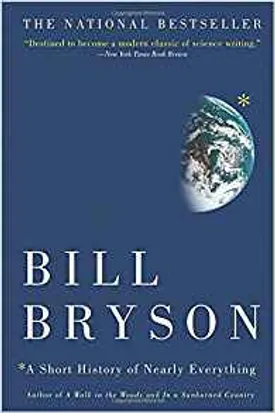A Short History of Nearly Everything by Bill Bryson
Bill Bryson's book "A Short History of Nearly Everything" is a fascinating trip through the history of science and of the universe in which we live. Published in 2003, the book has become an international bestseller and won the Aventis Prize for Science Books from the British Society of Authors.
Bryson takes a look at a vast range of topics, from chemistry and physics, to biology and geology, to botany and astronomy. He explains complex concepts in a way that is engaging and accessible to all readers, from experts to those who may never have encountered these areas before. Despite its length — it's nearly 600 pages! — Bryson includes many humoristic elements and anecdotes, which keep the reader engaged.
The book can help anyone understand the origins of our planet, and how the universe works. Bryson discusses how our solar system was created and how the Big Bang theory has informed our current understanding of cosmology. He looks at the formation of the Earth, and how its current location resulted from a process of collisions, heat and gravity. This leads to a discussion of the evolution of life on Earth, the diversification of species and the development of Homo sapiens. Bryson also talks about elements of climate science, geology and astronomy.
In his exploration of science, Bryson looks at a variety of people and their contributions to the field. He delves into the lives and works of many different figures such as Galileo, Newton, Darwin and Einstein, providing a fascinating overview of scientific discovery. He highlights moments and stories that shaped our understanding and gives readers a real understanding of the scientists and how they developed their theories.
As "A Short History of Nearly Everything" progresses, Bryson also looks at how our current knowledge of science is constantly shifting and improving with new discoveries. He also gives context to how this understanding has impacted the world and how it will continue to shape and inform our future.
Overall, "A Short History of Nearly Everything" is an authoritative and captivating look at the history of science, both in its past and present. Though there are many complicated topics discussed in the book, Bryson makes them feel accessible and engaging. Whether you're a scientist or someone who is simply curious about the world and universe in which we live, this book is an excellent read and a great way to learn a little of, well, nearly everything.

